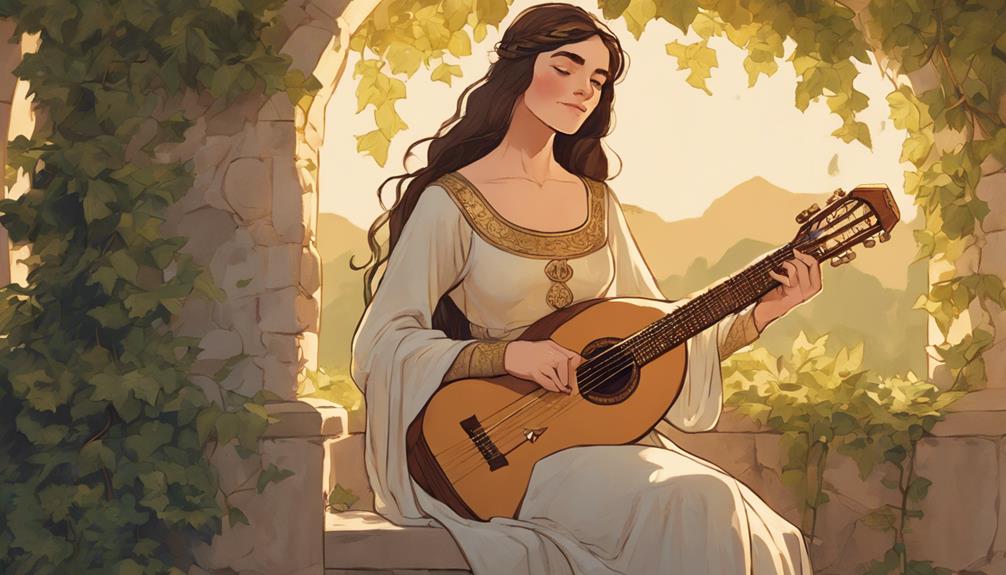As you explore the rich tapestry of medieval Occitan poetry, you'll encounter the fascinating world of trobairitz, female troubadours who defied conventions and introduced a feminine voice to the literary landscape. They subverted traditional gender roles, expanding the thematic scope of Occitan poetry and leaving a lasting impact on southern France's literary traditions. Through their poetry, they wielded agency, shaped their own narratives, and offered unique perspectives. As you venture further, you'll uncover the intricate themes of love and desire, social hierarchy, and feminine perspectives that characterized their works, ultimately transforming the medieval poetic tradition.
The Emergence of Trobairitz
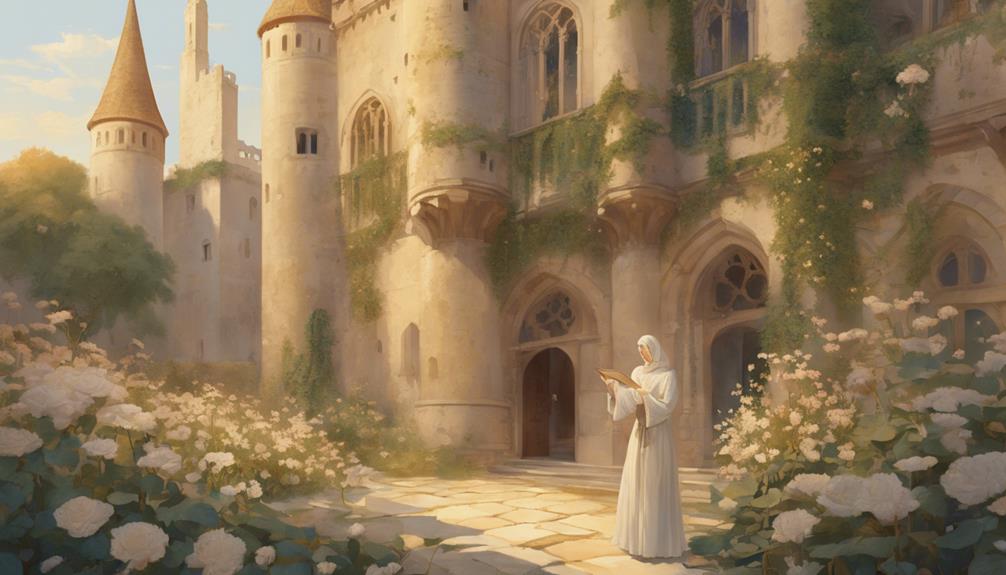
As you explore the domain of medieval Occitan poetry, it becomes apparent that the emergence of trobairitz, female troubadours, marked a significant shift in the literary landscape, introducing a distinctive feminine voice that resonated throughout the courts of southern France. This cultural context, characterized by a flourishing of artistic expression, provided an environment conducive to the rise of female poets. The historical significance of trobairitz lies in their ability to subvert traditional gender roles, claiming a space for themselves within the primarily male-dominated world of troubadour poetry. By doing so, they not only expanded the thematic scope of Occitan poetry but also offered a unique perspective on the courtly love tradition. As you investigate further into the world of medieval Occitan poetry, it becomes clear that the emergence of trobairitz was a pivotal moment, one that would have a lasting impact on the literary traditions of southern France.
Women's Voices in Occitan Poetry
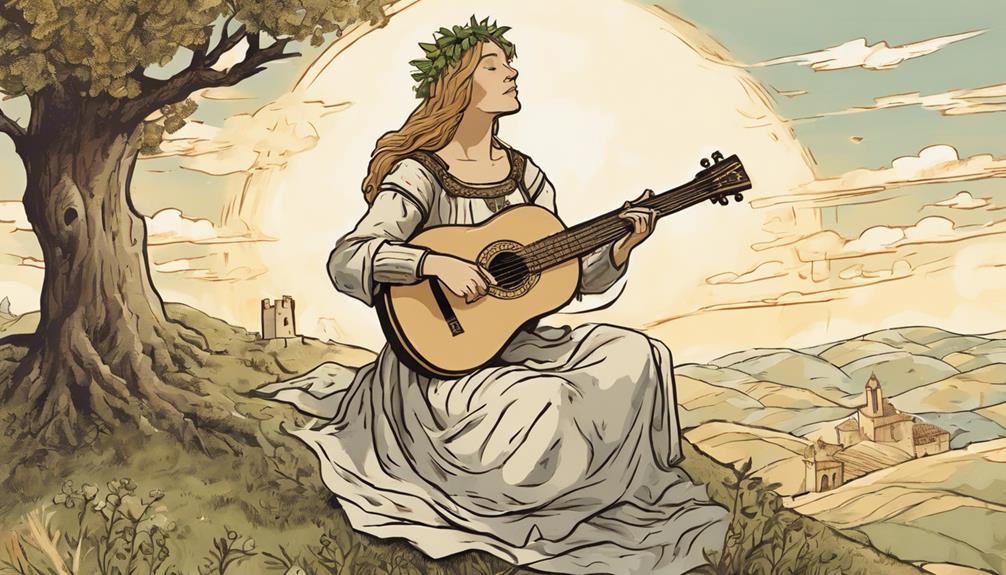
You're about to explore the realm of Occitan poetry, where the voices of women troubadours echo through the centuries, offering a fascinating glimpse into the lives and experiences of medieval women, whose poetic expressions not only reflected their own realities but also influenced the literary landscape of southern France.
As you immerse yourself in the world of Occitan poetry, you'll discover that women's voices are not mere whispers in the shadows of their male counterparts. Instead, they emerge as distinct entities, wielding poetic agency to shape their own narratives and challenge societal norms. The feminine mystique permeates their works, imbuing their poetry with a unique perspective that resonates deeply with their female audience. Through their verses, women troubadours assert their autonomy, exercising control over their creative output and the themes they choose to explore. This autonomy is particularly remarkable, given the patriarchal context in which they wrote. By examining the voices of women in Occitan poetry, you'll gain a nuanced understanding of the complex interplay between gender, creativity, and authority in medieval society.
Themes of Love and Desire
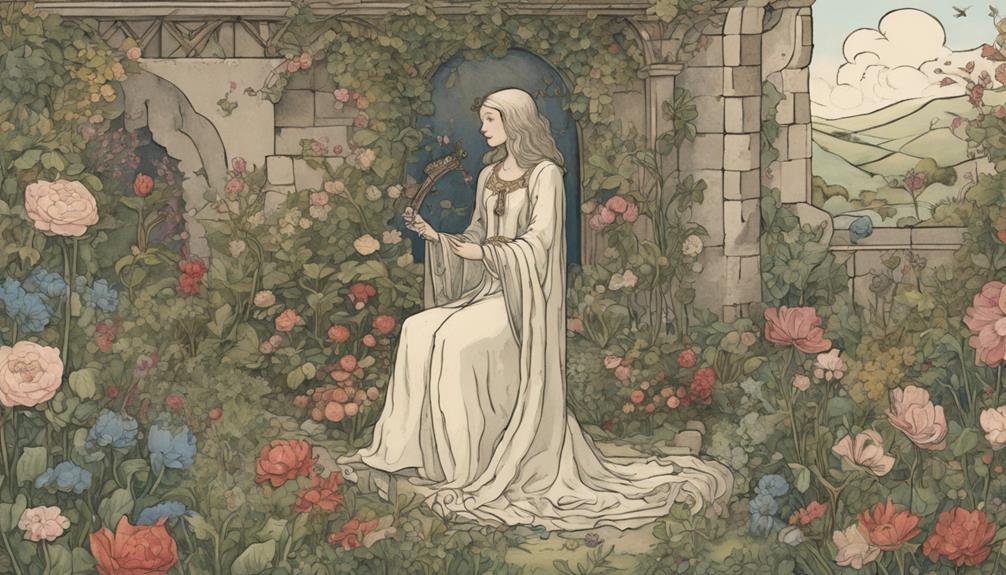
In the realm of Occitan poetry, women troubadours' verses often navigated the intricate complexities of love and desire, crafting a nuanced tapestry of emotions that resonated with their audience. As you explore their works, you'll uncover a profound exploration of courtly passion, often intertwined with Romantic ideals. These women poets didn't shy away from expressing intense longing, tender affection, and even bittersweet melancholy. Their lyrics frequently revolved around the pursuit of love, the agony of unrequited passion, and the fleeting nature of romantic bliss. You'll notice how they employed a rich, symbolic language to convey the turbulence of emotions, often blurring the lines between spiritual and earthly love. The troubairitz's unique perspective injected a fresh energy into the traditional courtly love genre, offering a more intimate, personal, and emotive voice that continues to captivate readers to this day. Through their poetry, you're invited to experience the intense passion, the heartaches, and the triumphs of love, all set against the backdrop of medieval Occitan culture.
Social Hierarchy and Status
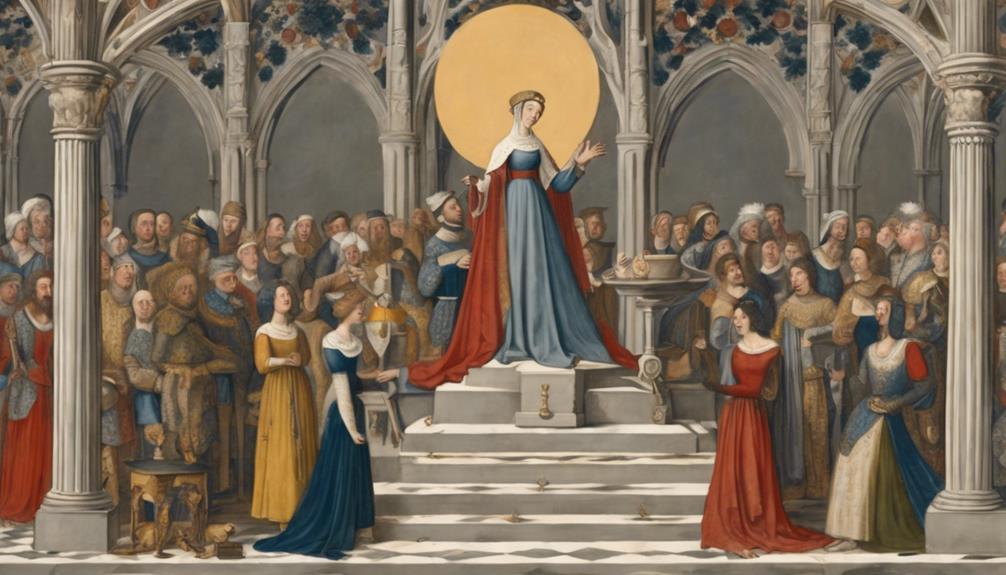
While the verses of women troubadours often focused on the intricacies of love and desire, their poetry also revealed a keen awareness of the social hierarchies that governed their lives. You'll notice that their works frequently alluded to the aristocratic influence that pervaded the courts of southern France. The courtly manners they depicted were not just superficial; rather, they served as a means of signifying social status and prestige. As you explore further into the poetry, you'll discover that the trobairitz didn't simply accept the constraints of their aristocratic surroundings – they often used their verse to subtly subvert and critique the social norms that restricted them. By doing so, they demonstrated a deep understanding of the intricate web of relationships that bound the nobility together. As you examine the poetry of these women troubadours, you'll come to appreciate the ways in which they navigated the complexities of medieval society, using their art to negotiate the boundaries of their own status and influence.
Female Perspectives in Song

Through their lyrics, female troubadours offered a distinctive feminine perspective on courtly love, one that subtly explored the traditional masculine-dominated genre, often by highlighting emotional introspection and personal autonomy. As you explore their songs, you'll notice that they frequently delved into themes of female agency, depicting women as active agents in romantic relationships rather than mere objects of desire. This shift in perspective granted women a sense of empowerment, allowing them to express their emotions and desires on their own terms. Musical empowerment was also a hallmark of these troubadours' work, as they often employed musical structures and melodies that reflected the emotional intensity of their lyrics. By doing so, they created a sonic landscape that was both intimate and expansive, allowing their listeners to immerse themselves in the emotional depths of their songs. Through their innovative use of language and music, female troubadours carved out a unique space for themselves within the medieval poetic tradition, one that continues to resonate with audiences today.
Legacy of the Troubadour Tradition
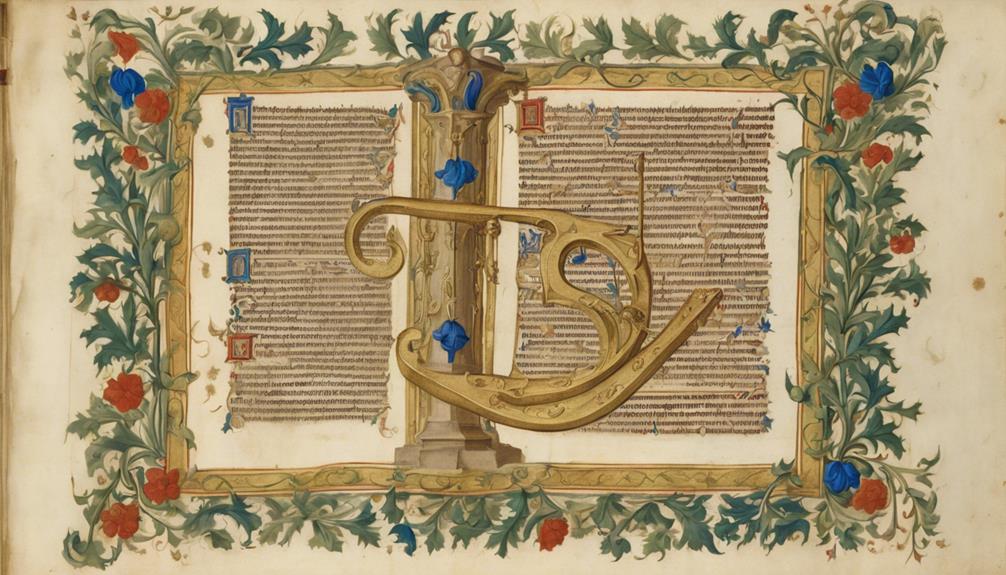
As you explore the innovative contributions of female troubadours, you'll discover that their poetic legacy extends far beyond the medieval courts, influencing a wide range of literary and musical traditions that followed. Their cultural significance lies in their ability to challenge traditional gender roles and push the boundaries of artistic expression. Through their lyrics, they not only gave voice to the experiences and emotions of women but also explored themes of love, morality, and social critique.
The troubadour tradition's artistic innovation can be seen in its impact on subsequent literary and musical movements. The use of vernacular languages, for instance, paved the way for the development of national literatures in Europe. Additionally, the troubadours' emphasis on courtly love and chivalry influenced the emergence of Romanticism in literature and music. As you examine further the legacy of the troubadour tradition, you'll uncover a rich tapestry of cultural and artistic influences that continue to shape our understanding of Western literary and musical heritage.
Rediscovering Forgotten Voices
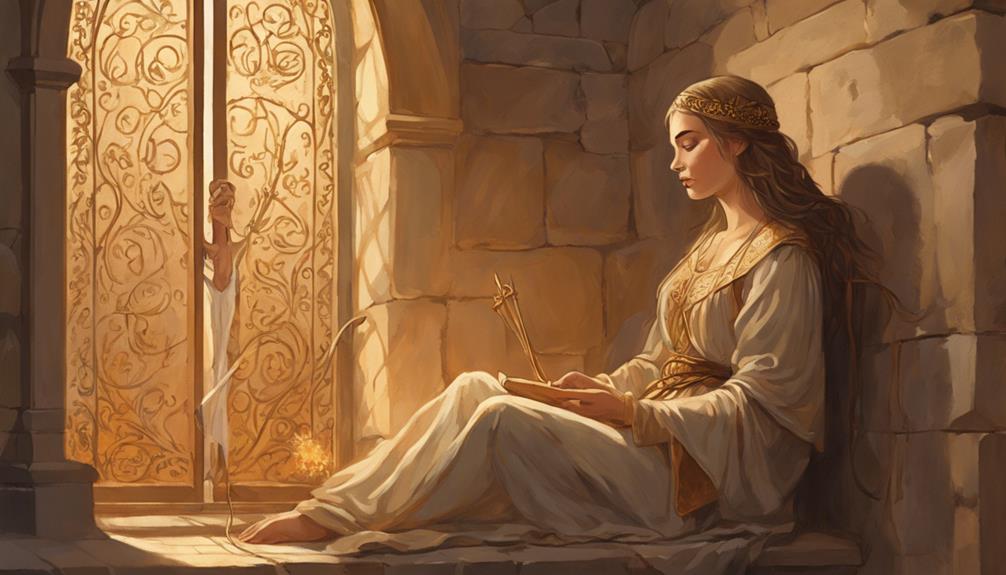
In delving into the history of medieval Occitan poetry, you'll uncover a wealth of forgotten voices, particularly those of female troubadours, whose innovative works have been overshadowed by their male counterparts. The rediscovery of these voices is essential in rewriting the literary canon, which has historically privileged male authors. Feminist archivists have played a key role in unearthing and reevaluating the works of female troubadours, challenging the dominant narrative that has marginalized their contributions.
Through meticulous research and analysis, these scholars have reconstructed the literary landscape of medieval Occitan poetry, revealing the significant contributions of female troubadours. By examining the language, themes, and stylistic devices employed by these women, researchers have shed new light on the complexities of medieval literature. The recognition of these forgotten voices not only enriches our understanding of the period but also highlights the need for a more inclusive literary canon. As we continue to uncover and celebrate the works of female troubadours, we move closer to a more nuanced and thorough understanding of medieval Occitan poetry.
Frequently Asked Questions
Did Women Troubadours Only Write About Romantic Love?
You're on the horns of a dilemma, wondering if women troubadours only wrote about romantic love. However, upon closer examination, you'll find that these medieval poets didn't just sing sweet nothings. They pioneered literary innovations, injecting emotional authenticity into their works. Their poetry explored complex themes, such as social commentary, politics, and even spirituality, revealing a rich tapestry of female experience that transcended romantic love.
Were Trobairitz Only From Noble or Aristocratic Families?
You might assume that trobairitz, these medieval female troubadours, exclusively emerged from noble or aristocratic families. However, historical records suggest that family dynamics played a more complex role. While some trobairitz did hail from aristocratic backgrounds, others rose to prominence through social mobility, leveraging their poetic talents to transcend their humble origins. This nuanced understanding of their social standing underscores the agency and adaptability of these remarkable women.
Can Trobairitz Poetry Be Considered a Form of Feminist Literature?
You believe feminism is a modern concept? Think again! As you explore the world of medieval poetry, you'll discover trobairitz challenging traditional gender roles. Their poetry, a form of literary agency, subverts patriarchal norms, giving voice to women's experiences and desires. By reclaiming their narrative, they defy the societal expectations imposed upon them. So, can trobairitz poetry be considered feminist literature? Absolutely, as it embodies the spirit of resistance and empowerment that defines feminist thought.
Did Trobairitz Perform Their Poetry Publicly Like Male Troubadours?
As you ponder the performance practices of medieval female poets, you wonder if they shared the spotlight with their male counterparts. Did they, like troubadours, recite their verses to courtly audiences, or did they shy away from public performance due to performance anxiety? The answer lies in the nuances of medieval social norms and the subtle dynamics of patronage, where women's roles were often relegated to the private sphere.
Are There Any Existing Musical Melodies for Trobairitz Poetry?
When exploring the musical accompaniment of medieval poetry, you'll find that few manuscript melodies specifically designated for trobairitz works have survived. However, musical reconstructions based on contemporaneous styles and instruments can provide valuable insights. Scholars have attempted to recreate the sonic landscape of the era, drawing from historical records and comparable melodies. While these reconstructions are educated guesses, they offer a fascinating glimpse into the aural experience of medieval poetry.
